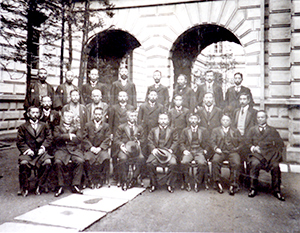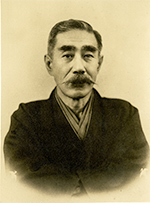In 1922 at the management meeting following his assumption of office as the fourth Director-General, Kinkichi Nakada stated: “Competition is central to a market economy as contenders win or lose, survive or die. But that isn’t the whole story. Sumitomo should not be the only one making money. Strive to be useful to the nation by contributing to the development and improvement of society through Sumitomo’s business.”
Before joining Sumitomo, Nakada served as a judge. With the probity of a jurist, he proceeded to establish Sumitomo’s internal regulations while acting decisively to overcome numerous difficulties.
For example, he instituted the Mining Camp Control Regulations in 1906. In those days, exploitation of miners by camp bosses was notorious. Under the regulations, Sumitomo paid wages directly to each miner and dismissed exploitive camp bosses. Nakada established modern employment relations.
In 1908, Nakada dealt with problem of smoke pollution at the Shisakajima Smelter. As the director of Osaka Head Office, he visited the polluted area, listened to local people, and devoted himself to finding a definitive solution.
On October 1, 1925, three years after he became the fourth Director-General, Nakada instituted a system whereby it became mandatory for employees to retire at 55 years of age and executives at 60. Nakada was 62. Having set a retirement age younger than his own age, Nakada retired only three years after his assumption of office as Director-General. Even as late as 1933, only 140 of 336 leading Japanese companies had introduced mandatory retirement systems. Sumitomo, a merchant house that had traded since the Edo Era, showed itself to be a fleet-footed innovator by introducing a mandatory retirement age.
Nakada was known for his self-discipline and strict dealing with others. But this toughness was always in the service of his determination to contribute to the nation and society, as articulated in the quotation at the beginning of this piece.

 EN
EN
